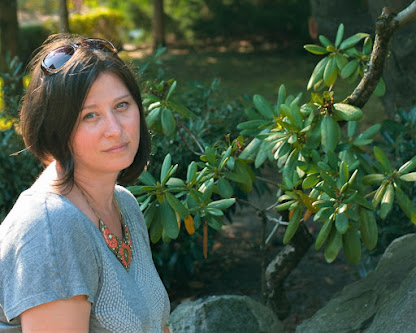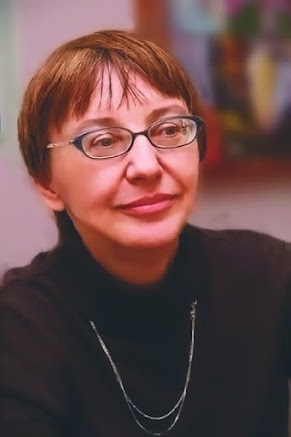I opened the last door, behind which neither of us existed—
I opened the last door, behind which neither of us existed—
another woman shuffles around the kitchen in worn slippers, clanging jars
another man lazes on the couch in track pants
smoking out of boredom and spitting on the floor
the other woman looks nothing like me, like two drops—
one from the sea and the other from the faucet
the other man, swollen like a lifebuoy, rubbed at the bends,
why’s he here? a reminder of summer
could these two really have had a summer
I opened the door and let in the light
that beats like a bird against a pane
I opened the door to where no one cares about the bird
another woman, fat and flat like an unplaned board
another man, fragile and hopeless like a rotten split log
not even a domestic squabble could strike a spark from them
ignite a fire
only ashes in the ashtray, ashes on their heads, everywhere ashes
I opened the heavy door like the lid of a coffin, like the eyelids of the dead
I opened the door, I can no longer close it
black hole
love
leaves a hole in a woman’s heart the size of a man
dream
first, then measure, minimize, exaggerate,
understate,
stay far from the edge
God,
don’t listen to the woman in love, the disappointed woman,
the
abandoned woman—don’t listen to any of them,
they
themselves don’t understand what they’re asking
love
leaves a hole in the woman’s heart the size of another woman
a
gaping void, a lacuna that cannot be sealed,
antimatter,
a blast wave, a prayer for revenge,
God,
don’t walk on
love leaves a hole in the woman’s heart the size of God
dropped stitch
I
climbed into myself headfirst, legs and all
I
pulled everything into my mouth
tasted spat it out
repented renounced
matured
I
thought to myself: I’ll take the first train out of here
anywhere
at all in every direction
if
death were a writer’s residency,
I
would have applied long ago
nothing
personal just sometimes you have to feel reality
as
getting burned
there
are always a few plots in your head,
you
never settle on a single script,
you create
something
I felt
like god had failed a bit with the world as a whole,
especially
the mortal
sometimes
the best poem—like sex with a stranger—
is
about nothing you want to remember
I knew
I didn’t need anyone enough
to
give him a human name
a few
careless strokes
nervous
laughter
a dropped stitch
summer is finite; the field, endless
***
summer is finite; the field, endless
there is nothing in sight
except the transparent bottom along which
some of us are returning home
with faded bangs—golden brown
like hot loaves taken out of the oven
maybe the grasshopper chirps too high
maybe the sun beats in our eyes too
sharply
maybe people are unfinished creatures
like red, hollow bricks
the ones you fire in the kiln’s heat
fingers and lips stained with blueberry
ink
as long as the pond is thick and shiny
as long as you walk across the
scorching sand
as long as you can outrun this shadow
long-legged, spirited, angular
this one slighty lower this one slightly
heavier
the sun will roll into the underbrush
as if into the jaws
of a whale or a cat—everything in its
own way
will be too big a “house” for us small
ones
God of forgotten words in fervent prayers
God of forgotten words in fervent prayers
God of the crucified on all three
crosses,
God of the not very sinful and indifferent
God of the Myrrhbearers at the tomb the
seven
who went to honor the body, even if he’s
not God,
the tortured human body, earthly body
God of despair and sorrow of bitter
wormwoods,
will you again roll away the stone from
human understanding?
will you again show them the way out to
your freedom?
a trio appeared to Mary of Magdala:
two angels and a man emerging from the
fog
went over to her, not allowing her to
touch him
I’m on my way, I’m no longer here, Magdelena,
my body’s ruined, and my spirit hovers
where there’s neither thorn of pain nor
spike of nail,
testify Mary, to others that for each of
us,
even the worst, God leaves a chance
to exit the body of suffering into the
inextinguishable light
you want to remove the pain quickly like a shirt
you want to remove the pain quickly like
a shirt
forgetting to unbutton the cuffs
the small white buttons that look like
pills
popping out, the sleeves turned inside
out
neither here nor there, neither on nor
off
with hands contorted in pain
you tug at them, eventually pulling them
free from flesh
the small white buttons that look like
pills
good people advise
wearing a shirt without buttons
without sleeves or with them rolled up
why’d you have to put that shirt on
anyway
with the small white buttons that look
like pills
if they don’t get rid of pain
some poems are like prescriptions for
medicines
that are no longer made
observing winter from the nursery window
observing winter from the nursery window
emptied and silent, smothered, shrunk,
like a cell that’s outgrown herself—
too mommy, too small, too
sentimental over things the eye catches
and the hand caresses
this road to the alley’s exit, this lantern, snowfall,
waiting makes you see them
in every passerby
but the voice of reason fetters false hope:
don’t guess, don’t call unexpectedly at inconvenient times
letting
go is the hardest of adult lessons
like
pulling a child’s sled behind you
choking
on acrid, ticklish laughter
when
something was already pulling
the
rope from your hands
Halyna Kruk (1974) is an award-winning Ukrainian
poet, writer, translator, and scholar. She is the author of five books of
poetry, Grown-Up (2017), (Co)existence (2013), The Face beyond the Photograph
(2005), Footprints on Sand, and Journeys in Search of a Home (both 1997), a collection
of short stories, Anyone but Me
(2021), which won the 2022 Kovaliv Fund Prize, and four children’s books, two
of which have been translated into 15 languages. A Crash Course in Molotov Cocktails was her first volume of
poetry published in English (Arrowsmith Press, 2022). Her numerous literary
awards include the Sundara Ramaswamy Prize, the 2023 Women in Arts Award, the 2021 BookForum Best Book Award,
the Smoloskyp Poetry Award, the Bohdan Ihor Antonych Prize, and the Hranoslov
Award. She holds a PhD in Ukrainian baroque literature (2001). Kruk is a member
of Ukrainian PEN; she lives and teaches in Lviv.
Photo credit: Oleksandr Laskin
Ali Kinsella holds an MA in Slavic studies from Columbia University and has been translating from Ukrainian for twelve years. She won the 2019 Kovaliv Fund Prize for her translation of Taras Prokhasko’s novella, Anna’s Other Days, forthcoming from Harvard University Press. In 2021, she was awarded a Peterson Literary Fund grant to translate Vasyl Makhno’s Eternal Calendar. She co-edited Love in Defiance of Pain (Deep Vellum Publishing, 2022), an anthology of short fiction to support Ukrainians during the war. Her other published translations include pieces by Stanislav Aseyev, Lyubko Deresh, Kateryna Kalytko, Myroslav Laiuk, Bohdana Matiiash, Olena Stiazhkina, and others.
Photo credit: Steve Kaiser
Pushcart Prize poet, award-winning
translator, and a founding editor of Four Way Books, Dzvinia Orlowsky is
the author of six poetry collections including Bad Harvest, a 2019
Massachusetts Book Awards “Must Read” in Poetry. She is a recipient of a
Massachusetts Cultural Council Poetry Grant, a Sheila Motton Book Award, and a
co-recipient of a 2016 National Endowment for the Arts Literature Translation
Fellowship. Her
first collection, A Handful of Bees, was reprinted as part of the
Carnegie Mellon University Press Classic Contemporary Series. Her new poetry
book, Those Absences Now Closest, is forthcoming from Carnegie Mellon in
fall 2024.
Photo credit: Max Hoffman
Kinsella
and Orlowsky’s co-translations of Natalka Bilotserkivets’s selected poems, Eccentric
Days of Hope and Sorrow (Lost Horse Press, 2021), was a finalist for the
2022 Griffin International Poetry Prize and the winner of the 2022 AAUS
Translation Prize. Their co-translations from the Ukrainian of Halyna Kruk’s selected poems, Lost in Living, is forthcoming from Lost Horse Press in spring, 2024.







